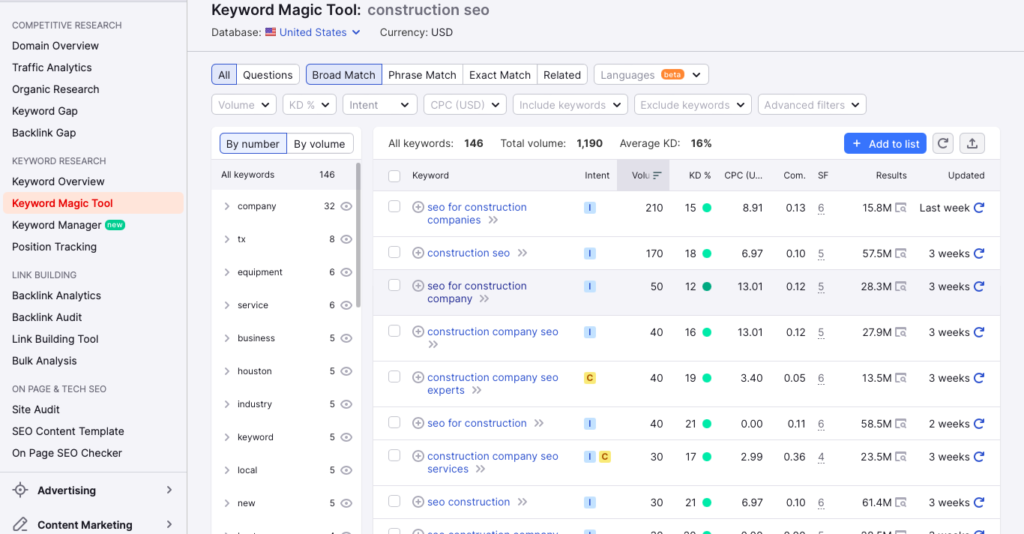In today’s digital age, having a strong online presence is crucial for the success of any business, and the construction industry is no exception. With the increasing competition in the construction sector, it’s essential for construction companies to implement effective digital marketing strategies, including search engine optimization (SEO). This comprehensive guide will bring you into the world of construction SEO services, providing you with the knowledge and insights to enhance your online visibility, attract more qualified leads, and drive sustainable growth for your construction business.
I. Understanding Construction SEO:
1.1 What is SEO?
Search Engine Optimization (SEO) is the process of improving a website’s visibility and organic (non-paid) rankings on search engine results pages (SERPs). It involves optimizing various elements of a website to make it more attractive to search engines, thereby increasing its chances of ranking higher for relevant search queries.
1.2 The Importance of SEO for Construction Companies:
SEO plays a vital role in the success of construction companies in the digital landscape. By implementing effective SEO strategies, construction businesses can:
- Increase online visibility and brand awareness.
- Attract more targeted and qualified leads.
- Drive organic traffic to their websites.
- Improve the user experience and website usability.
- Stay ahead of the competition in the online space.
1.3 How Search Engines Work:
To understand the importance of SEO, it’s crucial to grasp how search engines work. Search engines, such as Google, use complex algorithms to analyze and rank websites based on various factors. These factors include relevance, authority, user experience, and technical aspects. By optimizing your car rental seo services website according to these factors, you can improve your chances of ranking higher in search engine results as well.
II. Key Elements of Construction SEO:
2.1 Keyword Research:
Keyword research is a fundamental aspect of SEO. It involves identifying the relevant keywords and phrases that potential customers may use when searching for construction-related services or information. Effective keyword research helps you understand user intent and optimize your website content accordingly.
2.1.1 Identifying Relevant Keywords for the Construction Industry:

Start by brainstorming a list of relevant keywords related to your construction business. Consider terms such as “construction services,” “building contractors,” “residential construction,” and “commercial construction.” Use keyword research tools like Google Keyword Planner, SEMrush, or Ahrefs to discover additional keywords, search volume, and competition levels.
2.1.2 Long-Tail Keywords and Their Importance:
Long-tail keywords are longer, more specific keyword phrases that usually have lower search volume but higher conversion rates. They target a niche audience and help attract highly relevant traffic. For example, instead of targeting the broad keyword “construction services,” you could optimize for long-tail keywords like “residential construction services in [city]” or “commercial building contractors in [city].”
2.1.3 Tools for Keyword Research:
Several tools can assist you in conducting comprehensive keyword research, including Google Keyword Planner, SEMrush, Ahrefs, Moz Keyword Explorer, and Ubersuggest. These tools provide valuable insights into search volume, keyword difficulty, and related keywords to help you optimize your website content effectively.
2.2 On-Page Optimization:
On-page optimization refers to optimizing the elements on your webpages to improve their search engine rankings. It involves optimizing various on-page elements to make your website more appealing to both search engines and users.
2.2.1 Title Tags and Meta Descriptions:
Title tags are HTML elements that define the title of a webpage. They appear as the clickable headline in search engine results. Include relevant keywords in your title tags and make them compelling to attract clicks. Meta descriptions, on the other hand, provide a brief summary of a webpage’s content. Optimize meta descriptions with keywords and make them enticing to encourage click-throughs.
2.2.2 Optimizing Heading Tags:
Heading tags (H1, H2, H3, etc.) are HTML tags that define the headings and subheadings on a webpage. They help structure your content and indicate its relevance to search engines. Use heading tags to optimize your page content, incorporating relevant keywords naturally within them.

2.2.3 URL Structure and Permalink Optimization:
Ensure your website’s URLs are structured in a logical and descriptive manner. Use hyphens to separate words and keep them concise. Optimized URLs are easier for search engines and users to understand. Additionally, customize permalinks (permanent URLs) to include relevant keywords and make them more user-friendly.
2.2.4 Image Optimization:
Images are an integral part of construction websites. Optimize your images by compressing them to reduce file sizes and improve website loading speed. Use descriptive file names and add alt tags with relevant keywords to help search engines understand the image content.
2.2.5 Content Optimization Techniques:
High-quality, informative, and relevant content is critical for construction SEO. Optimize your content by incorporating relevant keywords naturally throughout the text. Aim for a balance between keyword optimization and readability. Break up content with subheadings, bullet points, and numbered lists for improved user experience. Include internal and external links to provide additional context and credibility.
2.3 Technical SEO: Turbocharge Your Construction Business with SEO Strategies
Technical SEO focuses on the backend elements of a website that impact its search engine visibility. It ensures that search engine crawlers can efficiently crawl, index, and understand your website’s content.

2.3.1 Site Speed and Mobile Responsiveness:
Website speed is a crucial ranking factor. Optimize your website’s loading speed by minimizing file sizes, leveraging browser caching, and using content delivery networks (CDNs). Additionally, ensure your website is mobile-friendly and responsive to provide an optimal user experience on mobile devices.
2.3.2 XML Sitemaps:
An XML sitemap is a file that lists all the pages on your website and provides important metadata about them to search engines. Create and submit an XML sitemap to search engines to facilitate the crawling and indexing process.
2.3.3 Schema Markup:
Schema markup is a structured data vocabulary that provides additional context to search engines about your website’s content. Implementing schema markup helps search engines understand your website better, leading to enhanced search engine visibility and rich search results.
2.3.4 Canonical Tags:
Canonical tags help address duplicate content issues on your website. They specify the preferred version of a webpage when multiple versions with similar content exist. Implement canonical tags to ensure search engines understand the primary version of your content and avoid potential penalties.

2.3.5 Redirects and Broken Links:
Redirects are necessary when you change the URL structure or remove pages from your website. Implement 301 redirects to ensure users and search engines are directed to the correct webpages. Regularly check for broken links and fix them promptly to improve user experience and maintain search engine rankings.

2.4 Off-Page Optimization: Dominate the Construction Industry with Effective SEO Services
Off-page optimization focuses on building your website’s authority and reputation through external factors. It involves strategies that take place outside of your website to improve its search engine rankings.
2.4.1 Link Building Strategies for Construction Websites:

Link building is the process of acquiring high-quality backlinks from other websites to your construction website. High-quality backlinks from authoritative websites indicate to search engines that your website is credible and trustworthy. Develop a link-building strategy that includes tactics such as guest blogging, outreach to industry influencers, and building relationships with other construction-related websites.
2.4.2 Guest Blogging and Influencer Outreach:
Guest blogging allows you to contribute valuable content to other websites in exchange for a backlink to your website. Identify reputable construction blogs or websites that accept guest posts and contribute high-quality, informative articles. Additionally, engage with influencers in the construction industry by collaborating on content or obtaining endorsements that can drive traffic and boost your website’s authority.
2.4.3 Social Media Marketing for Construction Companies:
Social media platforms provide an opportunity to promote your construction business, engage with your audience, and drive traffic to your website. Develop a social media marketing strategy that includes creating compelling content, sharing industry updates, engaging with followers, and promoting your construction projects.
III. Creating Engaging Content:
3.1 Importance of High-Quality Content for Construction SEO:
High-quality content is the backbone of successful SEO for construction companies. It attracts users, engages them, and encourages them to share and link to your website. Valuable content establishes your authority in the construction industry and improves your search engine rankings.
3.2 Creating Informative Blog Posts and Articles:
Blogs and articles allow you to showcase your construction expertise and provide valuable information to your target audience. When creating blog posts and articles, consider the following:
3.2.1 Choosing Relevant Topics:

Select topics that align with your target audience’s interests and address their pain points. Research trending topics and frequently asked questions in the construction industry. Develop content that offers unique insights and solutions.
3.2.2 Crafting Engaging Headlines and Introductions:
Create compelling headlines that grab readers’ attention and entice them to click. Craft introductions that provide a preview of the article’s value and generate interest to keep readers engaged.
3.2.3 Incorporating Keywords Naturally:
Integrate relevant keywords into your content naturally and avoid keyword stuffing. Focus on creating high-quality, informative content that satisfies user intent while incorporating keywords in headings, subheadings, and throughout the text.
3.2.4 Using Visuals and Multimedia:
Enhance your content with visuals such as images, infographics, and videos. Visual elements make your content more engaging and shareable. Incorporate multimedia elements that provide a rich user experience and support your construction-related topics.
3.3 Utilizing Video Marketing for the Construction Industry:
3.3.1 Showcasing Construction Projects and Case Studies:
Video marketing is a powerful tool for construction companies. Showcase your completed construction projects, highlight unique features, and share customer testimonials through videos. This allows potential clients to see your work firsthand and builds trust and credibility.
3.3.2 Creating How-to and DIY Videos:
Educational videos that provide step-by-step instructions on construction techniques or home improvement projects can attract a wider audience. Use videos to demonstrate your expertise and provide value to viewers, positioning your construction business as an industry leader.
3.3.3 Optimizing Videos for Search Engines:
To improve the visibility of your videos, optimize them for search engines. Use descriptive titles, include relevant keywords in video descriptions and tags, and create engaging thumbnails. Host videos on platforms like YouTube and embed them on your website for increased exposure.
IV. Local SEO for Construction Companies:
4.1 Importance of Local SEO in the Construction Industry:
Local SEO focuses on optimizing your construction website to appear in local search results. For construction companies targeting specific geographic areas, local SEO is crucial for attracting local customers and driving foot traffic to physical locations.
4.2 Google My Business Optimization:
Google My Business (GMB) is a free tool provided by Google that allows businesses to manage their online presence. Optimizing your GMB listing helps improve local search visibility.

4.2.1 Claiming and Verifying Your Google My Business Listing:
Claim ownership of your GMB listing and verify it to ensure accurate business information and access additional features.
4.2.2 Optimizing Business Information and Categories:
Ensure your business name, address, phone number (NAP), and other contact information are accurate and consistent across all online platforms. Choose relevant categories that accurately represent your construction services.
4.2.3 Collecting Reviews and Ratings:
Encourage satisfied customers to leave reviews and ratings on your GMB listing. Positive reviews enhance your online reputation and influence potential customers’ decision-making process.
4.2.4 Posting Regular Updates and Photos:
Keep your GMB listing updated with relevant posts, offers, and news. Share high-quality photos showcasing your construction projects to provide visual appeal and attract potential customers.
4.3 Local Citations and Online Directories:
Local citations are online mentions of your business name, address, and phone number on various platforms, including online directories, review sites, and industry-specific listings. Consistent and accurate citations help improve your local search rankings.
4.3.1 Identifying Relevant Local Directories and Listings:
Research local directories and listings specific to the construction industry. Ensure your business information is listed accurately and consistently across these platforms.
4.3.2 Optimizing Local Citations:
Optimize your local citations by providing complete and up-to-date information. Include relevant keywords, business descriptions, and images where possible.
4.3.3 Building Relationships with Local Influencers and Partners:
Collaborate with local influencers, industry associations, and other businesses in your area. Seek opportunities for co-marketing efforts, joint events, or sponsorships to expand your local reach and improve your local SEO.
V. Measuring and Analyzing SEO Performance:
5.1 Importance of SEO Analytics for Construction Companies:
Measuring and analyzing your SEO performance is crucial to understanding the effectiveness of your strategies and identifying areas for improvement. It helps you make data-driven decisions to optimize your construction website further.
5.2 Setting up Google Analytics:
Set up Google Analytics to track and analyze your website’s performance. Monitor metrics such as organic traffic, bounce rate, average time on page, and conversion rates.
5.3 Tracking Keyword Rankings:
Monitor your keyword rankings regularly to assess the impact of your SEO efforts. Utilize keyword tracking tools to track your progress and identify opportunities for optimization.
5.4 Analyzing Website Traffic Sources:
Understand the sources of your website traffic by analyzing the channels that drive the most visits. Identify which sources deliver the highest-quality traffic and focus your efforts accordingly.
5.5 User Behavior Analysis:
Analyze user behavior metrics, such as bounce rate, time on page, and pages per session, to understand how visitors interact with your website. Identify areas where users might be dropping off or experiencing difficulties to optimize the user experience.
5.6 Conversion Tracking:
Implement conversion tracking to measure the effectiveness of your SEO efforts in generating leads and conversions. Set up goals and track conversions to understand the ROI of your SEO campaigns.
VI. Online Reputation Management and Ratings:Construction Business to New Heights
6.1 The Impact of Online Reputation on Construction Businesses:
Online reputation plays a significant role in attracting customers to construction companies. Positive reviews and ratings build trust, credibility, and differentiate your business from competitors.
6.2 Encouraging Online Reviews:
Actively encourage satisfied customers to leave online reviews on platforms such as Google, Yelp, and industry-specific review sites. Provide exceptional service and follow up with customers to request their feedback.
6.3 Responding to Reviews:
Monitor and respond to both positive and negative reviews promptly and professionally. Thank customers for positive reviews and address any concerns raised in negative reviews. Show that you value customer feedback and are committed to resolving issues.
VII. Hiring Professional Construction SEO Services:
7.1 Benefits of Outsourcing SEO Services:
Outsourcing SEO services to professionals can provide numerous benefits for construction companies. SEO agencies have the expertise, tools, and resources to develop and execute effective SEO strategies, allowing you to focus on your core business activities.
7.2 Selecting the Right SEO Agency for Your Construction Business:
When choosing an SEO agency, consider factors such as experience, industry knowledge, track record, client testimonials, and communication transparency. Discuss your goals, expectations, and budget with potential agencies to ensure a good fit.
Conclusion:
Implementing effective SEO strategies is essential for construction companies looking to thrive in the digital era. By understanding the key elements of construction SEO, creating engaging content, optimizing for local search, analyzing performance, managing online reputation, and considering professional plumber SEO services, your construction business can achieve higher visibility, attract qualified leads, and drive sustainable growth in the highly competitive online landscape. Embrace the power of SEO and position your construction company for success

I would like to introduce myself as Uttam, an Internet Marketing Expert and professional a blogger and founder of Ur Computer Technics. Also, I’m a passionate entrepreneur, SEO Specialist, and fitness freak.







